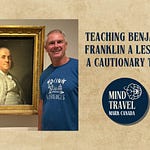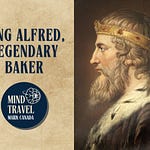Happy new year! I hope each of you has a splendid 2025. I deeply appreciate your engagement with Mind Travel. It's a great pleasure to write the weekly columns. I hope you find them interesting, perhaps even inspiring.
As an educator, I believe that knowledge and skills empower students — all of us, really — to change our lives and our world for the better. Now, through Mind Travel, Ring the Bell, and the other parts of Mind Inclined, I enjoy the opportunity to offer the same kind of empowerment to a broader audience — all of you!
This month's series, "Better with Ben: Franklin's Tips for Living Better," is an obvious case in point. Throughout January 2025, I will be drawing on the life and work of one of my favorite authors, Benjamin Franklin, to help you make the most of the new year. Along with my weekly columns, such as this week's column below, I will record Ring the Bell podcasts featuring pearls from Ben and deliver several free in-person and virtual lectures. Visit mindinclined.org to register for the lectures — and look for the columns right here on Substack.
We would love to learn how you are using the columns and podcasts to improve your life. Please drop us a line at mark.canada@mindinclined.org or post a comment. Finally, please remember to "like" the post if you read something that resonates with you. Thanks!
What's the very first thing you must have before you change yourself for the better? Motivation? Self-discipline? A plan? All of these things are important, but something else comes first: belief.
Let's take a common New Year's resolution of getting healthier. The first question you need to ask is "Do I believe I can get healthier?" This question is a more specific example of a big question that has intrigued thinkers for a long time: "Do humans have free will?" I'm not here to give you the definitive answer to that question, but obviously I — and every other person giving you advice on self-improvement — believe we can control our lives. Otherwise, the advice would be meaningless.
Best known as a scientist, inventor, and nation's founder, Benjamin Franklin was also an author, and one of the messages that he conveyed in his writings was the power of will, encapsulated in his famous aphorism "God helps them that help themselves." Franklin believed not only that he could change himself for the better, but also that others could improve themselves, as well. Indeed, he believed in humans' ability to improve entire communities. In this respect, he embodied and articulated a chief principle of the Enlightenment — that is, that humans can understand and control their world.
Perhaps the best evidence of this belief was his formation of something called the Junto, a group of Philadelphians, including tradesmen like Franklin (a printer at the time). Under Franklin's leadership, the members took up queries such as these:
Hath any citizen in your knowledge failed in his business lately, and what have you heard of the cause?
Have you lately heard of any citizen’s thriving well, and by what means?
Have you or any of your acquaintance been lately sick or wounded? If so, what remedies were used, and what were their effects?
Do you think of any thing at present, in which the Junto may be serviceable to mankind? to their country, to their friends, or to themselves?
Do you know of any deserving young beginner lately set up, whom it lies in the power of the Junto any way to encourage?
Have you lately observed any defect in the laws of your country, [of] which it would be proper to move the legislature for an amendment? Or do you know of any beneficial law that is wanting?
Have you lately observed any encroachment on the just liberties of the people?
Hath any body attacked your reputation lately? and what can the Junto do towards securing it?
Is there any man whose friendship you want, and which the Junto or any of them, can procure for you?
Some of these queries could help individuals be more successful. Knowing the causes of business failures and the means of fellow citizens' successes, for example, could help the members avoid similar failures and achieve their own successes. Note, though, that the Junto's queries also were designed to help the members support one another and improve their communities. This was not merely a selfish endeavor. For example, the queries call for suggestions for ways the group can "be serviceable to mankind" and support worthy young people.
The members of the Junto also pooled their resources to create a library, which would allow them to learn from one another's books. This was the beginning of the public lending libraries that eventually proliferated throughout the United States.
I find these queries and the Junto's library inspiring because they reflect Franklin's — and my — belief in the power of humans to elevate themselves and the world around them.
Franklin voiced this same belief in his autobiography, which he began writing in 1771 at the age of 65 and expanded on three occasions over the next two decades. Indeed, although he wrote his book in the form of a narrative, as we would expect of an autobiography, the many lessons he integrated into it make it also a kind of self-help book, the first wildly successful example of the genre in American history. In his account of his life, he describes many — but not all — of his many achievements. For example, he touches on his publication of his successful Poor Richard's Almanack, but not his invention of a musical instrument, called a glass armonica, which consisted of wet glass bowls rubbed with the fingers. (Franklin said, "Of all my inventions, the glass armonica has given me the greatest personal satisfaction.")
Franklin's message of believing in one's ability to improve is evident in the first paragraph of this book. It begins:
Dear Son,
I have ever had a Pleasure in obtaining any little Anecdotes of my Ancestors. You may remember the Enquiries I made among the Remains of my Relations when you were with me in England; and the Journey I took for that purpose. Now imagining it may be equally agreeable to you to know the Circumstances of my Life, many of which you are yet unacquainted with; and expecting a Week's uninterrupted Leisure in my present Country Retirement, I sit down to write them for you. To which I have besides some other Inducements. Having emerg'd from the Poverty and Obscurity in which I was born and bred, to a State of Affluence and some Degree of Reputation in the World, and having gone so far thro' Life with a considerable Share of Felicity, the conducting Means I made use of, which, with the Blessing of God, so well succeeded, my Posterity may like to know, as they may find some of them suitable to their own Situations, and therefore fit to be imitated.
You probably noticed that intriguing first line. Although Franklin clearly addressed this narrative to his son, he could be cagey, and we can't be sure that he intended his story to be read only by his son. As Franklin scholar Leo Lemay has noted, in 1771 William Franklin was not a child obviously in need of instruction, but a man in his forties. I have no inside knowledge here, but, given what I know about Franklin after years of study, I would guess that he really did have his son on his mind, was sincere in his remarks about wanting to share details of his life, and perhaps even imagined that his son would benefit from his instructional narrative. At the same time, he also probably realized — or came to think as he wrote more and more — that his story could prove useful to a much broader audience.
At any rate, what is clear in this first paragraph is that Franklin believed that humans could improve their lot. After all, he was sharing the "means" he used to become successful with his son or anyone else because he believed these means were "fit to be imitated." In other words, his reader or readers could deliberately take similar actions with the hope of achieving similar results. "They worked for me," Franklin says in so many words, "so they just might work for you, too."
"Don't stop believing." Long before Steve Perry sang those words as the front man for the band Journey, Benjamin Franklin was living them and conveying them with his Junto and autobiography. The next time you need some inspiration, just imagine Franklin playing this song on his armonica and belting out the words with feeling. OK, he's no Steve Perry, but, come on, he's Benjamin Franklin!










